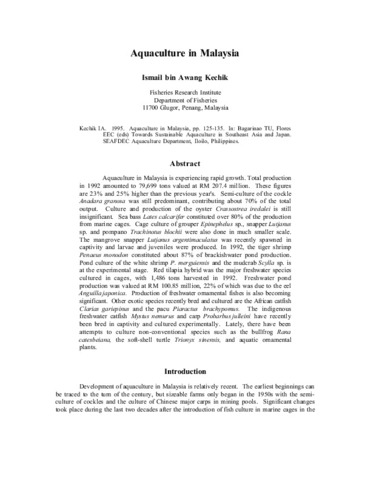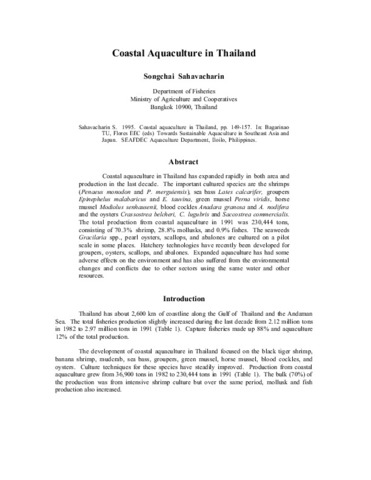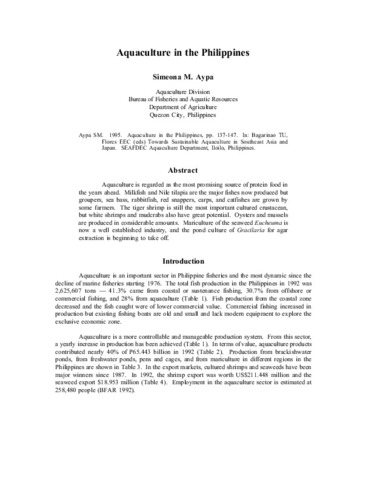| dc.contributor.author | Fermin, Armando C. | |
| dc.contributor.editor | Juario, Jesus V. | |
| dc.contributor.editor | Benitez, Lita V. | |
| dc.date.accessioned | 2011-06-06T02:33:58Z | |
| dc.date.available | 2011-06-06T02:33:58Z | |
| dc.date.issued | 1988 | |
| dc.identifier.citation | Fermin, A. C. (1988). Broodstock management and seed production of tilapia and carp. In J. V. Juario & L. V. Benitez (Eds.), Perspectives in Aquaculture Development in Southeast Asia and Japan: Contributions of the SEAFDEC Aquaculture Department. Proceedings of the Seminar on Aquaculture Development in Southeast Asia, 8-12 September 1987, Iloilo City, Philippines. (pp. 211-230). Tigbauan, Iloilo, Philippines: SEAFDEC, Aquaculture Department. | en |
| dc.identifier.isbn | 971851113X | |
| dc.identifier.uri | http://hdl.handle.net/10862/132 | |
| dc.description.abstract | Bighead (Aristichthys nobilis) and silver (Hypophthalmichthys molitrix) carps were reared in ponds, pens and floating cages in Laguna Lake until maturity. Spontaneous gonadal maturation and rematuration of carp broodstock occurred within 2-2.5 years with average weight of 3-4 kg. Under lake conditions, broodstock were not given supplemental feeds. Induced spawning of gravid females was done by intraperitoneal injections using HCG combined with either common carp pituitary homogenates or LHRH-A. Stripping and dry-fertilization of eggs were done 6-8 hr after the final injection. Eggs were incubated in water containing 300-500 ppm Total Hardness. Fertilization and hatching rates were 23-88% and 7-36%, respectively. Post-larval carps were reared in tanks and fine-meshed nylon net cages installed in manured ponds. Tank-reared post-larvae were fed with Brachionus plicatilis and subsequently with Moina macrocopa in combination with powered formulated feeds containing 40% crude protein. Fry were harvested and stocked in nursery cages after 30-45 days of rearing in tanks.
Four-month old 50-100 g tilapia (Oreochromis niloticus) stocked in hapa net cages, tanks or ponds were used for breeding. Egg and fry production was significantly high at 4 females/m2 stocking density Different sex ratios, however, did not affect fry production. Spawning frequency and total growth of broodstock was highest in fry fed formulated diets containing 50% crude protein. Harvesting of fry was done every 15 days during summer months and every 21 days during cold months. Fry were reared in tanks and hapa cages and fed diets containing 35% crude protein. Supplemental feeding in the lake was suspended when productivity reached 3 gC/m2 /day. | en |
| dc.language.iso | en | en |
| dc.publisher | Aquaculture Department, Southeast Asian Fisheries Development Center | en |
| dc.subject | Hypophthalmichthys molitrix | |
| dc.subject | Aristichthys nobilis | |
| dc.subject | Brachionus plicatilis | |
| dc.subject | Moina macrocopa | |
| dc.subject | Oreochromis niloticus | |
| dc.subject | Philippines, Luzon I., Laguna de Bay L. | en |
| dc.title | Broodstock management and seed production of tilapia and carp | en |
| dc.type | Conference paper | en |
| dc.citation.spage | 211 | |
| dc.citation.epage | 230 | |
| dc.subject.asfa | stocking density | en |
| dc.subject.asfa | sex ratio | en |
| dc.subject.asfa | freshwater lakes | en |
| dc.subject.asfa | pond culture | en |
| dc.subject.asfa | Incubation | en |
| dc.subject.asfa | induced ovulation | en |
| dc.subject.asfa | spawning | en |
| dc.subject.asfa | Freshwater fish | en |
| dc.subject.asfa | sex hormones | en |
| dc.subject.asfa | feed composition | en |
| dc.subject.asfa | rearing techniques | en |
| dc.subject.asfa | fecundity | en |
| dc.subject.asfa | breeding | en |
| dc.subject.asfa | sexual maturity | en |
| dc.subject.asfa | cage culture | en |
| dc.subject.asfa | tanks | en |
| dc.subject.asfa | feeding experiments | en |
| dc.subject.asfa | gonads | en |
| dc.subject.asfa | breeding stock | en |
| dc.subject.asfa | hatching | en |
| dc.subject.asfa | aquaculture techniques | en |
| dc.subject.asfa | fish culture | en |
| dc.citation.conferenceTitle | Seminar on Aquaculture Development in Southeast Asia, 8-12 September 1987, Iloilo City, Philippines | en |



